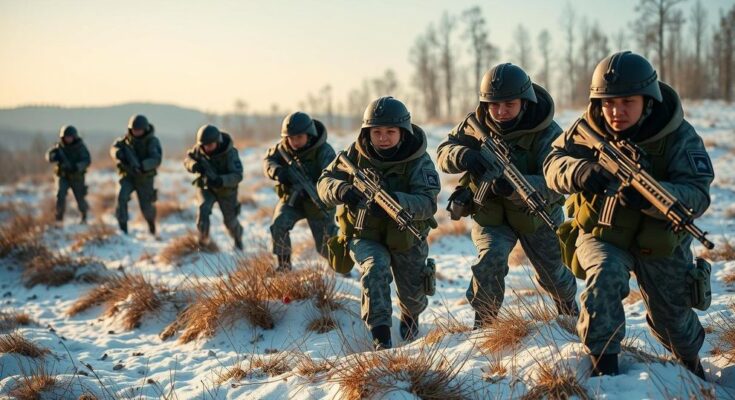Ukrainian forces face North Korean troops, newly deployed to support Russian military efforts. Despite initial inexperience, these soldiers have quickly adapted to combat, raising concerns over their growing capabilities. The dynamic presents challenges for Ukraine and global security, as North Korea aims to enhance its military expertise while allied with Russia.
Ukrainian forces are confronting a new adversary in the ongoing conflict: North Korean troops deployed to support Russia after Ukraine launched an offensive in the Kursk region this past summer. The entry of these soldiers marks a concerning escalation in the war, particularly as they quickly adapt to combat situations, gaining essential battlefield experience. Despite initial inexperience, the North Koreans have exhibited discipline and tactical improvement in their military operations.
Historically, North Korea possesses one of the world’s largest standing armies; however, its foreign military engagements since the Korean War have been few, resulting in limited exposure to modern warfare tactics. Analysts express concern that the North Korean soldiers may now acquire critical military skills while acting alongside Russian forces, a situation that poses a new global security threat. Ukraine’s military intelligence spokesperson, Andrii Yusov, emphasized, “For the first time in decades, the North Korean army is gaining real military experience. This is a global challenge.”
The presence of North Korean soldiers in Ukraine has been a contentious issue, with estimates of their numbers ranging from 10,000 to 12,000 according to various intelligence reports. However, Russia has not publicly acknowledged their involvement. Their tactical deployment alongside Russian units has raised alarms within Ukraine, particularly as they employ their own equipment and adopt strategies amid the war’s complex dynamics.
Despite early tactical errors, such as vulnerable troop movements, North Korean forces are rapidly adjusting, exhibiting improved proficiency during nighttime operations. Some Ukrainian military personnel have noted their speed and adherence to tactical routines, while also acknowledging their significant losses due to prior inexperience. President Zelenskyy estimated North Korean casualties to be as high as 4,000, though U.S. intelligence suggests a lower figure.
The North Korean military doctrine, rooted in outdated concepts from decades ago, complicates their effectiveness on the modern battlefield. However, experts assert that their disciplined training—if combined with real battlefield experience—may evolve them into a formidable military presence. The phenomenon of North Korean soldiers avoiding capture reflects a deeply ingrained military culture that perceives surrender as dishonor.
Moreover, U.S. officials, including Dorothy Camille Shea, have raised alarms regarding the ramifications of North Korea’s evolving battlefield capabilities, warning that such experiences could lead to military advancements that may destabilize the region further. The situation remains dynamic, and the potential for North Korea to leverage these lessons internationally in arms sales is an ongoing concern.
As the conflict in Ukraine unfolds, the alliance between North Korea and Russia may reshape the strategic landscape, prompting global actors to reassess their security and military strategies in response to this developing partnership.
The deployment of North Korean troops to support Russia highlights a significant shift in the conflict dynamics within Ukraine, particularly as these soldiers gain combat experience and adapt to modern military strategies. North Korea’s military has historically engaged in limited foreign operations, predominantly due to its concentrated focus on domestic ideology and regional isolation. The recent military cooperation between North Korea and Russia, cemented by an agreement to provide military assistance, raises questions about the implications for global security and geopolitical stability as these two nations align more closely against a common adversary. Experts are particularly concerned about the potential increase in North Korea’s military capabilities and the implications for regional security, especially concerning its neighbors.
In summary, the involvement of North Korean troops in Ukraine represents a newly alarming phase in the ongoing conflict, as these forces not only contribute to Russia’s military efforts but also gain crucial battlefield experience. Despite initial inexperience, they have begun to adapt and improve their tactics, raising concerns among military analysts and prompting discussions about the broader implications for global security. The strategic partnership between North Korea and Russia not only poses immediate challenges in Ukraine but may also influence military dynamics in the region and beyond, necessitating vigilant responses from other global powers.
Original Source: www.newspressnow.com




